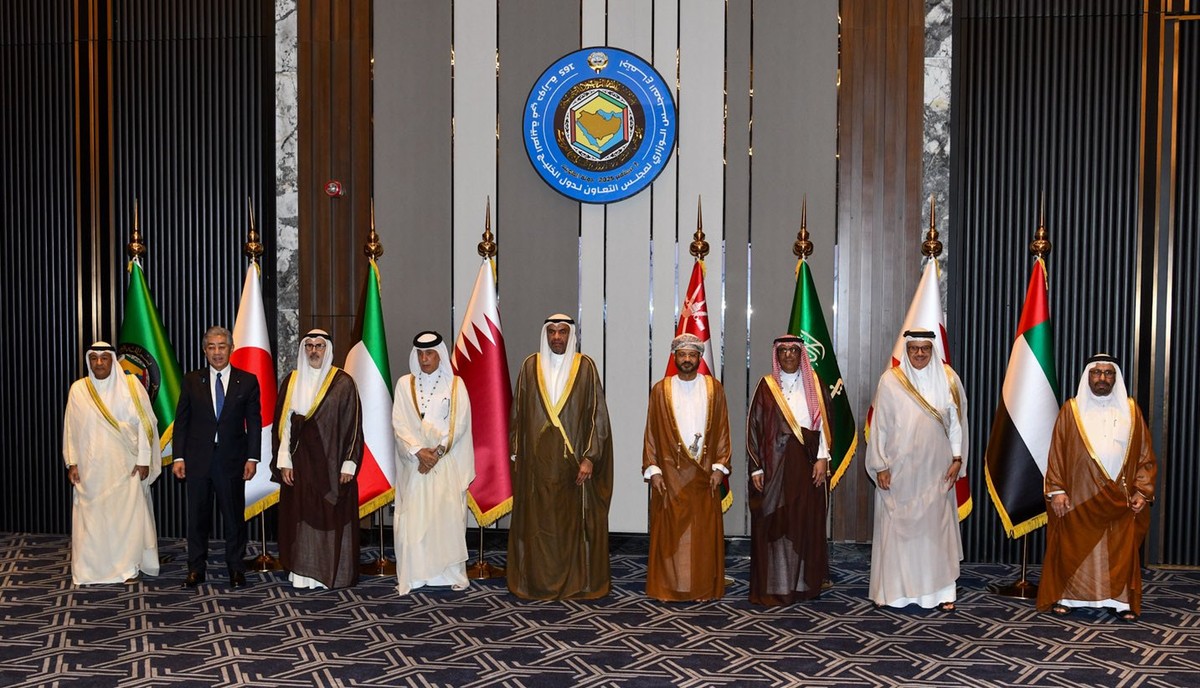01/09/2025
01/09/2025

He welcomed Japanese Foreign Affairs Minister Takeshi Iwaya, while extending his gratitude and appreciation to His Highness the Amir Sheikh Meshal Al-Ahmad Al- Jaber Al-Sabah and His Highness the Crown Prince Sheikh Sabah Al- Khaled Al-Hamad Al-Sabah for Kuwait’s generous hosting of this joint meeting and the capabilities and high-level organization it provided, refl ecting its prestigious position in supporting the GCC and its international partnerships. He also thanked Kuwait’s Foreign Affairs Minister Sheikh Abdullah Al-Yahya for his tremendous efforts and tireless follow-up to ensure the success of the meeting and build bridges of cooperation and partnership with friendly countries. He expressed his pride in the development of Gulf-Japanese relations at all levels -- from political coordination, trade exchange and energy cooperation to high-level cultural and academic exchange, indicating the meeting is the best evidence of the steady growth of these relations. He pointed out that the meeting was held amid international circumstances characterized by rapid political, economic and security transformations, which require solidarity and stronger partnerships to address common challenges like food security, climate change, energy security and digital transformation. He said the partnership with Japan is emerging as a strategic choice that serves mutual interests.
He disclosed that the achievements with Japan include the signing of the Memorandum of Understanding for Cooperation and Strategic Dialogue in 2012, launching the 2024-2028 Joint Action Plan, announcing the launch of negotiations for a free trade agreement with the signing of the joint statement on July 16, 2023 in Jeddah, and signing the terms of reference on Aug 19, 2024 in Tokyo. He added the volume of trade exchange is expected to reach $115 billion, and $84 billion of which are Gulf exports, mostly oil, gas and petrochemicals, and $31 billion are imports from Japan in the fields of automobiles, technology and advanced industrial products. He cited the growth of Japanese investments in the GCC countries, exceeding $15 billion in the renewable energy, digitalization and smart industries, which reflects Japan’s confidence in the Gulf business environment.
He emphasized that what has been achieved so far is only one step on a long road, expressing his aspiration for enhancement of strategic consultations to ensure regional stability and the security of maritime routes, invest in the digital economy, artificial intelligence, clean energy, and carbon capture technologies, develop cooperation in food security and sustainable agriculture, expand cultural and tourism exchanges, and work together to achieve net-zero carbon neutrality by the middle of the century. He concluded by stressing that the GCC partnership with Japan is not based solely on economic and political interests, but rather on a shared vision for a future of peace and sustainable development. He reiterated his gratitude to the State of Kuwait for its generous sponsorship and sincere efforts, to Japan for its sincere cooperation, and to all participants for their valuable contributions. He hopes that the discussions will yield new practical steps that strengthen the strategic partnership and open broader horizons for the prosperity of the peoples of both sides. On the number of Gulf students in Japanese universities, he pointed out the 25 percent increase in the number of Gulf students at Japanese universities since 2020, and the expansion of academic and research exchange programs to develop knowledge transfer and capacity building. He went on to say that the meeting discussed different aspects of joint Gulf action and views exchanged between parties, in addition to holding a joint Gulf-Japanese ministerial meeting.
He clarified that the postponement of the Gulf-Ukrainian ministerial meeting, which was scheduled for Monday, was due to the Ukrainian Foreign Minister’s inability to leave the capital, Kyiv. He stated this Gulf ministerial meeting is the last of the regular meetings hosted by Kuwait during its current presidency. He added that this month and the next two months will witness a significant number of meetings -- 14 specialized ministerial meetings. He said “we are very proud of the achievements we made in the Gulf during the past period, which strengthened our blessed journey and have had a significant positive impact on the GCC countries and Gulf citizens.” He added that the two meetings addressed several regional and international issues at the political level, particularly the current situation in the Gaza Strip and the serious and brutal violations committed by the Israeli occupiers against the Palestinian people. He stressed that these violations have exceeded the bounds of logic and reason and undermined international laws and treaties, significantly impacting global security and stability.
He also expressed his concern about the international community’s inability to stop these practices and violations. He explained that the meeting with the Japanese Affairs Foreign Minister provided an opportunity to invite Japan to join the international coalition to recognize the State of Palestine, adding that the Gulf side received positive responses from Japan, with the Japanese Minister confirming that Tokyo will study this matter. He pointed out that the meeting also touched on the distinguished and historical Gulf-Japanese relations. He added “we share common positions, as the two sides seek to strengthen these positions to reach broader horizons. It was also agreed to implement the joint action plan (2024-2028), which includes cooperation in the fields of energy, trade, investment, academic and cultural activity, in addition to proceeding with the free trade agreement between the two sides.”


